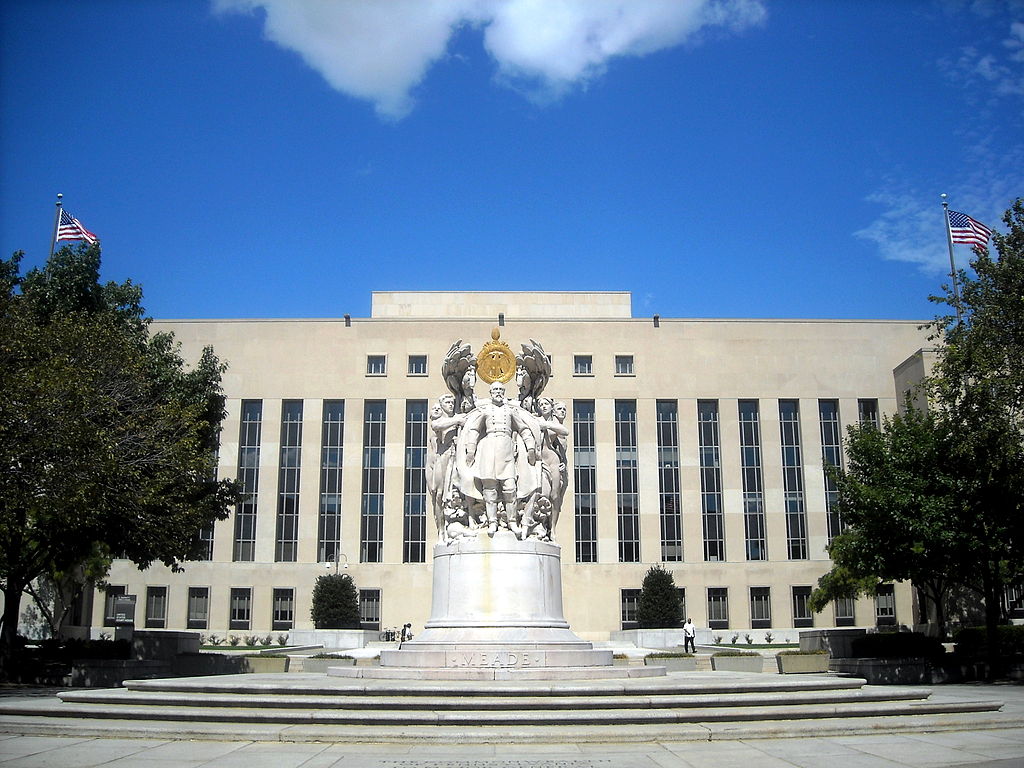Judge permits two more immigrant teenagers to have abortions while in federal custody

E. Barrett Prettyman Courthouse, home of the U.S. District Court for the District of Columbia. Photo by AgnosticPreachersKid, via Wikimedia Commons.
Updated: A federal district judge in Washington, D.C., issued an order (PDF) Monday permitting abortions for two more pregnant teenagers in the custody of federal immigration authorities. The decision provoked an immediate, simultaneous appeal to the U.S. Court of Appeals for the D.C. Circuit and the U.S. Supreme Court for one of the teens.
As the Washington Post and Politico reported earlier Monday, Jane Roe and Jane Poe sought court intervention because the U.S. Department of Health and Human Services made a policy in March that it will not “facilitate” abortions for minors in its custody. Both are ready to have the procedure and able to pay for it, but because they are in federal custody, must still compel authorities to allow them to visit doctors. Roe is 10 weeks pregnant; Poe is 22 weeks pregnant. Within an hour of the order, the administration said they would allow Poe to have the abortion but requested a two-week stay in the appeal of Roe’s case, the Los Angeles Times reported.
Roe and Poe are part of the same lawsuit as “Jane Doe,” the 17-year-old who petitioned the court in October for an order forcing the government to permit her to have an abortion. In that case, U.S. District Judge Tanya Chutkan issued a temporary restraining order allowing the procedure, and Doe ultimately underwent the procedure after appeals to a D.C. Circuit panel and the full D.C. Circuit. Chutkan issued a similar temporary restraining order Monday, saying the situation has not materially changed since she decided Doe’s case.
“ORR continues to claim—and in the case of [Poe], has actually exercised—ultimate authority to unilaterally veto the reproductive choices of the unaccompanied minors in its custody,” Chutkan wrote. “If defendants are not immediately restrained from … interfering with or obstructing their access to an abortion, [Roe] and [Poe] will both suffer irreparable injury in the form of, at a minimum, increased risk to their health, and perhaps the permanent inability to obtain a desired abortion to which they are legally entitled.”
The federal government appealed right away. A press statement emailed by HHS said the department was disappointed by the ruling.
“A pregnant minor who has entered the country illegally has the option to voluntarily depart to her home country or identify a suitable sponsor,” wrote a spokesperson for the Administration for Children and Families. “HHS-funded facilities that provide temporary shelter and care for unaccompanied alien minors should not become way stations for these children to get taxpayer-facilitated abortions.”
By law, unaccompanied immigrant minors are taken into shelters run by HHS’s Office of Refugee Resettlement until a relative or sponsor can be found for them in the United States. HHS made a policy last March that it would not “facilitate” abortions for such minors. Politico says Scott Lloyd, the head of ORR, is active in opposition to abortion and meets personally with every unaccompanied minor in HHS custody who seeks an abortion. The American Civil Liberties Union, which is representing the teens, says this policy amounts to an unconstitutional ban on abortion.
In court papers, the federal government defends its policy, saying it “has strong and constitutionally legitimate interests in promoting its interest in life, in refusing to facilitate abortion, and in not providing incentives for pregnant minors to illegally cross the border to obtain elective abortions while in federal custody.” The ACLU, which is representing the teens, says this policy amounts to an unconstitutional ban on abortion.
Chutkan appeared to agree at Monday’s hearing, where the Post says she “seemed skeptical” about the government’s claims. DOJ attorney August Flentje told the court federal authorities thought the abortion would not be in Jane Poe’s best interests “based on the concern about the impact on her,” but Chutkan questioned that, noting that Poe is being held in a state with no parental notification requirement for her age group.
“How does ORR have more right over her than her parent?” the judge reportedly said.
The earlier Jane Doe case generated an unusual side dispute over whether attorneys for Doe made misleading statements about when and whether Doe could get an abortion. Doe was being held in Texas, where the law requires counseling 24 hours prior to Doe’s abortion. That counseling had already taken place, so Doe’s attorneys were able to arrange the procedure soon after the D.C. Circuit’s order.
The Justice Department did not immediately petition the U.S. Supreme Court for a stay, and it argues that Doe’s attorneys misled them into thinking the abortion would take more time. The ACLU says in its response that there was no such representation, and that DOJ attorneys should have acted more quickly.
In Roe’s case, the appeal to the D.C. Circuit was filed immediately. In a simultaneous filing, the government also asked the U.S. Supreme Court to block the abortion, the Constitution Daily reports. The Supreme Court filing was both a request for an immediate delay in the abortion and a “backup maneuver to offset the chance” that the appeals court would not grant a stay, according to the article.
Last updated at 10:05 p.m. to note the Los Angeles Times coverage. Updated on Nov. 19 to note the Supreme Court filing.



